How pro-Russia and pro-China influencers cross-promote state narratives
Influencers critical of the West have formed a mutually beneficial community on Twitter, amplifying Russian and Chinese state narratives on a range of issues
How pro-Russia and pro-China influencers cross-promote state narratives
Share this story
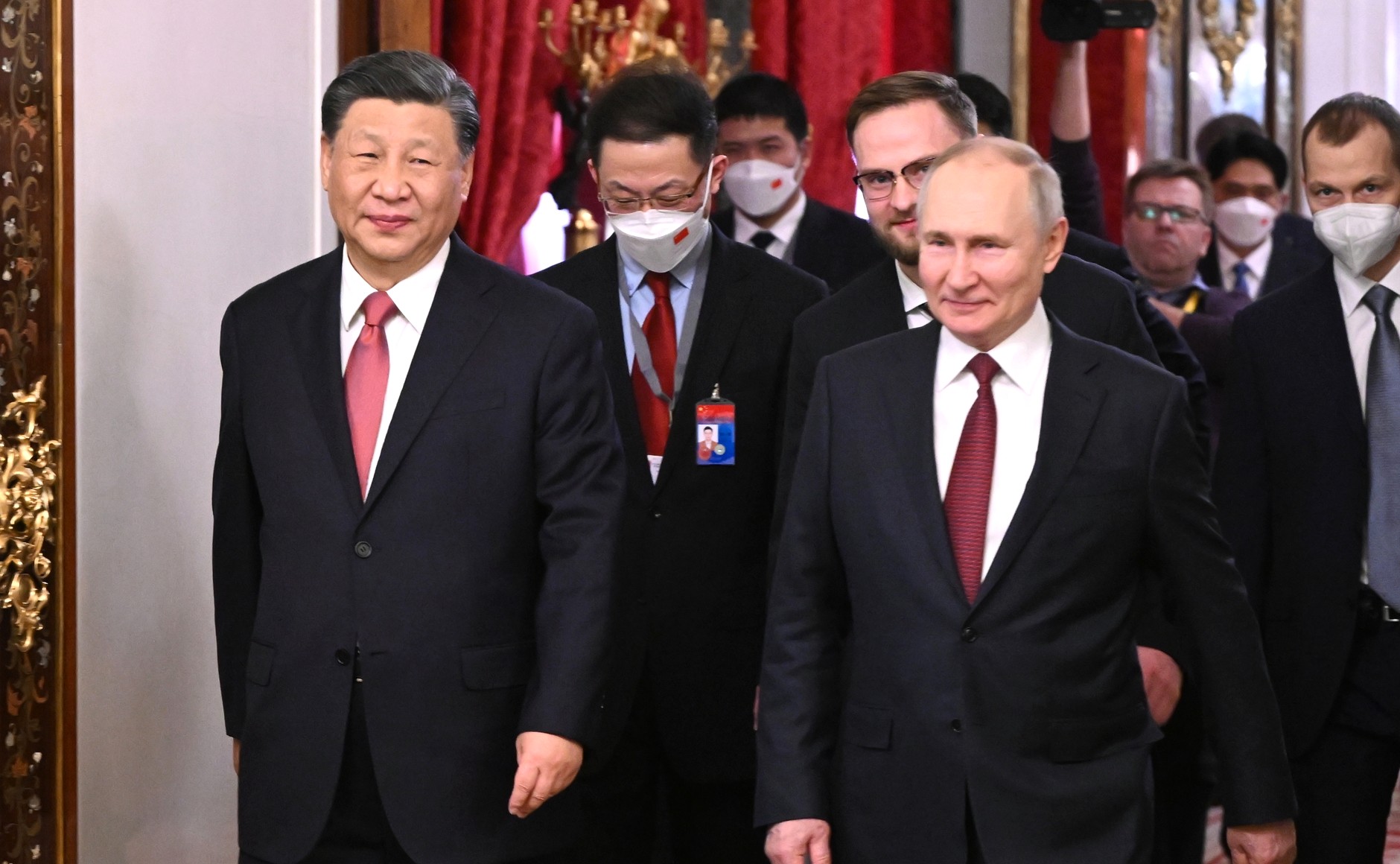
BANNER: China President Xi Jinping attends the official welcoming ceremony as he meets Vladimir Putin at the Kremlin in Moscow on March 21, 2023. (Source: Reuters/Kremlin handout/EYEPRESS)
Pro-Russia and pro-China influencers have formed a mutually beneficial community on Twitter to amplify state narratives from both countries. This community is transnational, cross-platform, and multilingual, which makes it effective in disseminating disinformation advantageous to China and Russia. These influencers are united in their perceived battle against Western imperialism. Many of the pro-Russia influencers minimizing the impacts of Vladimir Putin’s war against Ukraine and parroting Chinese state narratives cut their teeth on the Syrian civil war and are applying the same tactics to Ukraine. Since Russia invaded Ukraine in 2022, the cross-amplification of narratives between supporters of authoritarian regimes has become more apparent. Additionally, the DFRLab has found evidence of questionable engagement metrics on some of the influencers’ posts.
The pro-China and pro-Russia alliance reflects the broader diplomatic and media cooperation agreements between the two countries. In 2013, Voice of Russia and People’s Daily Online signed a content-sharing agreement during Chinese President Xi Jinping’s first visit to Moscow. In 2014, RT and People’s Daily agreed to share online news sources. In 2015, China’s Xinhua News Agency and RT signed an agreement to increase the mutual use of news content.
Furthermore, on February 4, 2022, Xi and Russian President Vladimir Putin issued a joint statement: “The sides reiterate their readiness to deepen cooperation in the field of international information security and to contribute to building an open, secure, sustainable, and accessible ICT environment.” The two countries also signed a series of cooperation agreements, including one focused on cooperation in the fields of “informatization and digitalization.” The growing collaboration in the media and digital domains illustrates the two countries’ common goal to reshape global governance in their favor.
On March 20, 2023, Xi met with Putin at the Kremlin to kick off a three-day state visit intended to deepen China and Russia’s bilateral efforts to revise the world order in their favor. The two leaders penned articles in the other’s state paper, Rossiyskaya Gazeta and People’s Daily, where they reaffirmed their strategic partnership, celebrated historical cooperation, and called for a more “just” and “true” multi-polar world order. In their official remarks published on March 21, the two leaders emphasized their alignment on numerous issues regarding economic policy, trade, and security. This was soon followed by a joint statement in which Xi and Putin expressed a willingness for the two sides “to strengthen policy communication and cooperation in the field of radio and television, promote cooperation in joint productions, inter-broadcasting of programs, technology research, development, and application, and promote common development of the industry.” The two governments also signed a memorandum of cooperation between state media entities China Media Group and Rossiyskaya Gazeta.
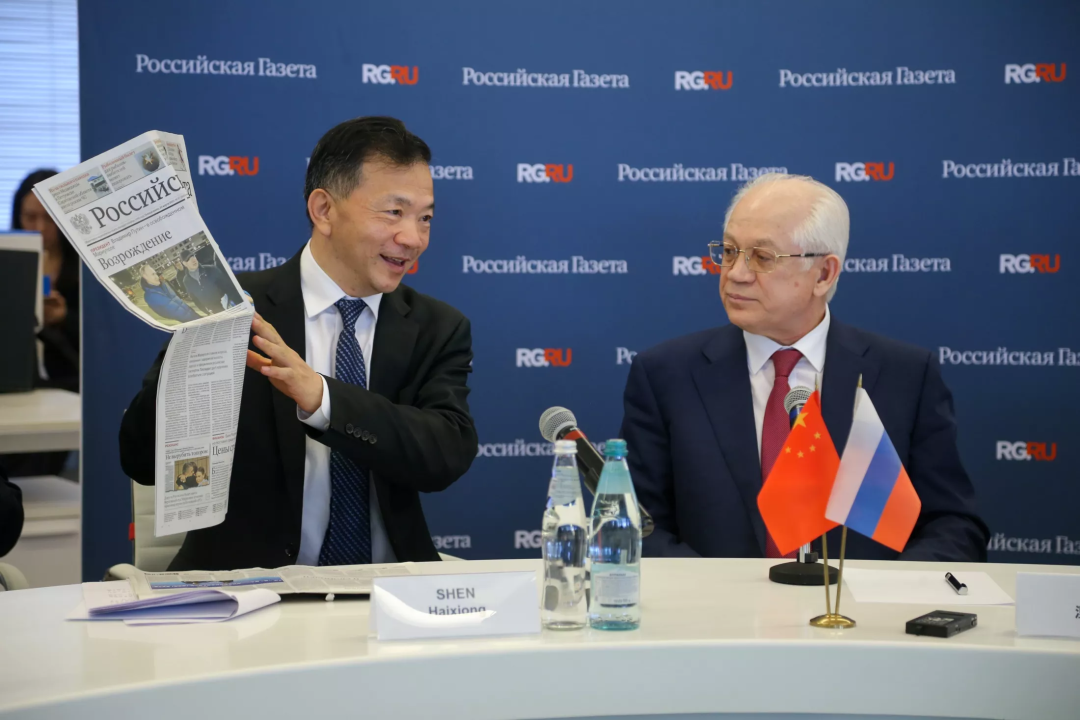
Pro-China and pro-Russia influencers sharing anti-Ukraine narratives on Twitter demonstrate their affinity for authoritarian regimes as they willingly amplify Russian and Chinese state propaganda to further their ideological battle with the West. As Russia and China’s media strategy intertwines, so do their influencers.
Pro-China influencers share anti-West narratives
Pro-China influencers frequently popularize Chinese state media narratives on Western social media platforms. For example, the defense of Xinjiang human rights violations by these accounts exemplifies their solidarity with Beijing. Under pretenses of counterterrorism, the Chinese government forced more than a million Muslims, mainly from the Uyghur ethnic group, into reeducation camps in Xinjiang. The detainees’ forced labor in manufacturing and agriculture has supplied global companies such as Apple and Nike. When Western governments sanctioned Chinese officials in March 2021 over human rights abuses in Xinjiang, a wave of protests was sparked against Western apparel companies in China. On Weibo, state media accounts were among the most active users that amplified hashtags such as “Taobao removes H&M products” (淘宝下架HM商品) and “Huang Xuan terminates cooperation with H&M” (黄轩终止与HM合作). The backlash spilled over to Facebook when People’s Daily created the “I support Xinjiang cotton” campaign.
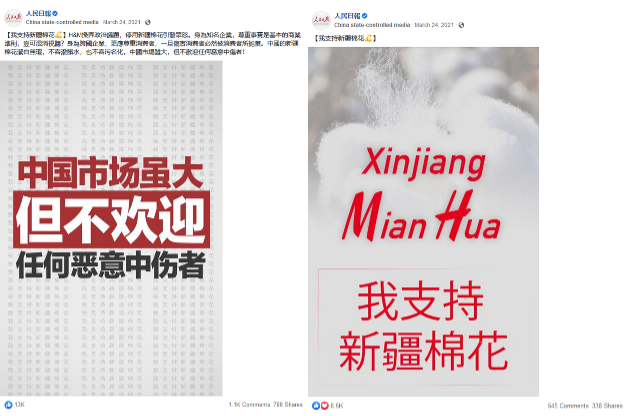
The pro-China Twitter account @gmply5555 (13,100 followers) was among the first to bring the “I support Xinjiang cotton” campaign to Twitter. Other popular pro-CCP personalities soon followed. Chinese-American Twitter influencer and frequent CGTN guest @CarlZha (106,000 followers) vocally opposed the cotton boycott. On Twitter, he spoke of the pushback from Chinese companies and celebrities, published non-sequiturs on Uyghur cuisine, and criticized the United States. Another pro-China influencer, Lee Barrett (30,800 Twitter followers; 342,000 YouTube subscribers), produced a YouTube video “debunking” the use of forced labor in Xinjiang. Since banning Western reporters from Xinjiang, Beijing has favored providing foreign influencers with special access to the region as a way to control the narrative. The generous organizational and monetary support the Chinese state provided to produce Barrett’s videos in China points to existing ties with the Chinese government. In another example, CGTN leveraged an influencer to go on a state-guided tour of Xinjiang with the goal of presenting a sense of normalcy. These influencers willingly become mouthpieces of the state, which the Chinese media, in turn, amplifies on social media. Coopting foreign influencers to bestow authenticity is a public relations tactic that was also used in Syria, where online influencers were accused of whitewashing Assad’s crimes. Some of those same influencers who propped up the Assad regime through trips to Damascus are now spreading pro-Russia and pro-China content.
The pro-China community does not limit itself to only promoting Beijing’s positions, it also parrots pro-Russia talking points. For example, Russia has justified the invasion of Ukraine by promoting the false narrative that claims the NATO armament of Ukraine began before the war. On February 18, 2022, RT quoted the pro-Russia commentator and former United Kingdom MP George Galloway (447, 800 followers) as saying, “The real thing that has provoked this crisis is the pumping of Western trainers, troops, mercenaries, and weapons into Ukraine.” On February 21, 2022, the Russian embassy stated that weapons help “Kyiv to pursue [a] military solution” rather than prioritizing humanitarian goals. Days later, after Russia officially invaded Ukraine, Chinese influencer Barrett shared similar views on Twitter, framing his arguments primarily around the West.
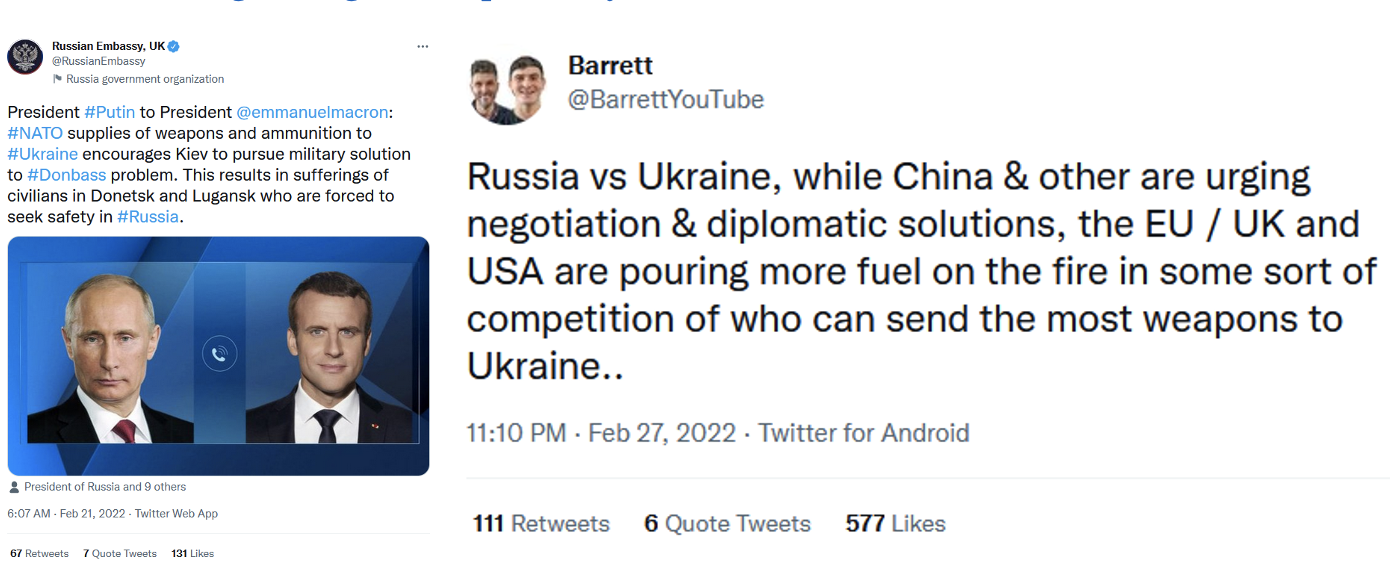
An additional narrative used to justify the invasion of Ukraine was spread by the Russian Ministry of Defense, which popularized a conspiracy theory that claimed the United States funded bioweapons laboratories in Ukraine. Doublethink Lab found that this conspiracy was propagated by Chinese state media, Russia-aligned conspiracy theorists, and Chinese cyber-nationalists known as “little pinks.” Accusations of bioweapon labs are a persistent theme within the “little pinks” community, particularly after the emergence of Covid-19. Videos produced by Russian and Chinese media furthered this bioweapons conspiracy theory and were shared by pro-China accounts like @gmply5555 and @CarlZha.
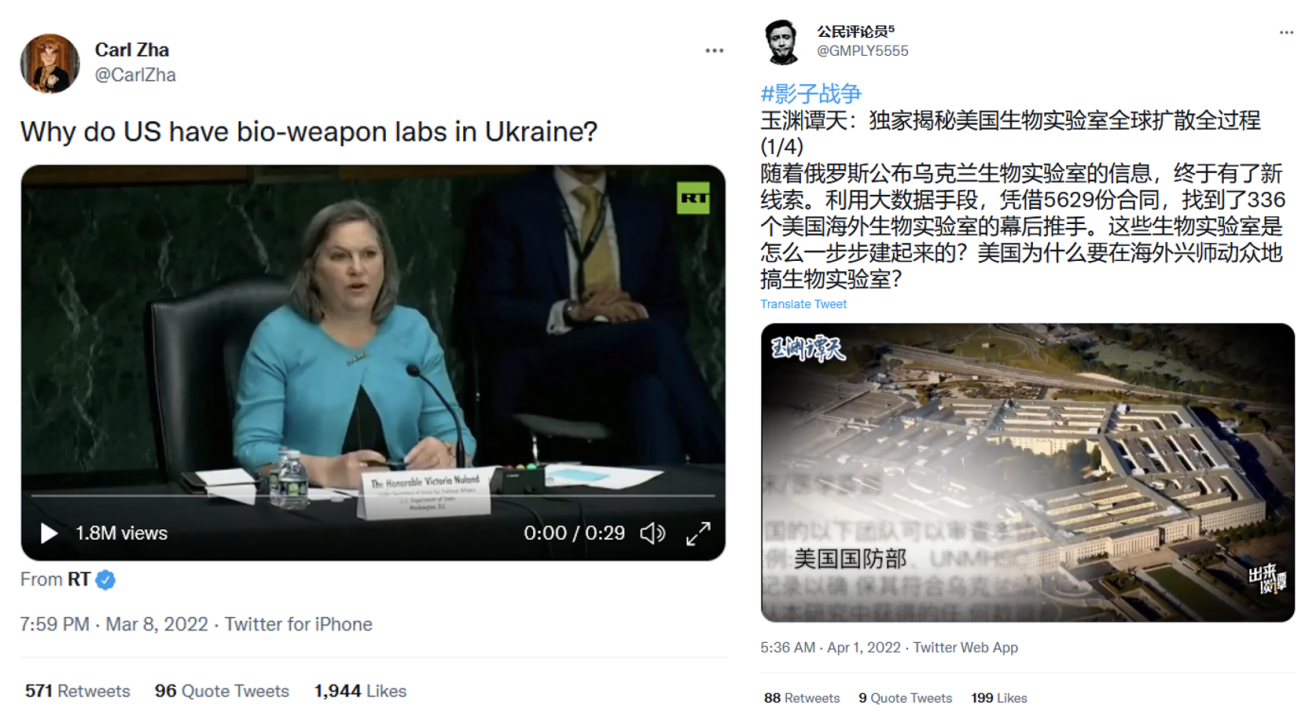
Conspiracy theorist George Webb (75,700 followers), who Chinese social media users describe as an “American investigative journalist,” was an enduring voice driving the bioweapons narrative on Twitter. Since the beginning of the Covid-19 pandemic, Webb has shared various biolab conspiracies. For example, he actively spread the Fort Detrick conspiracy theory in defense of China, which was then amplified by Chinese nationalist accounts on Weibo and garnered more than one million views.
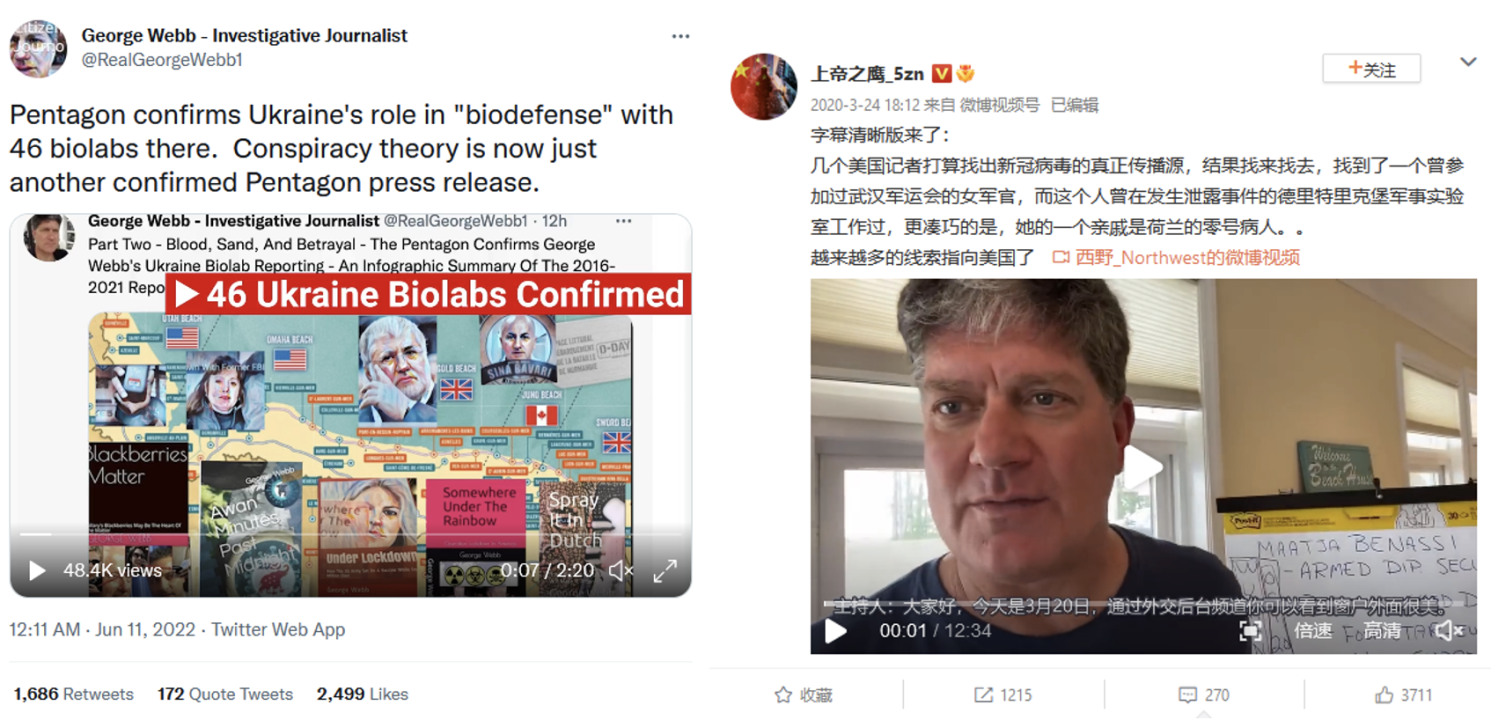
Pro-China and pro-Russia accounts also denied the massacre in Bucha. As Russian troops retreated from the Kyiv region they left a trail of at least 458 bodies in and around Bucha. As allegations of possible war crimes in Bucha emerged, pro-China and pro-Russia accounts rushed to deflect the condemnations. In a YouTube interview, Galloway described Bucha as a “false flag operation.” During the interview, Bucha is compared to a Russian narrative circulated by pro-Russia influencers during the Syrian civil war, which falsely claimed the White Helmets volunteer rescue service staged false flag attacks. Further, Barrie VVeiss (2,000 followers), who runs a pro-China tabloid, reiterated Galloway’s denialism in a tweet promoting Galloway’s Bucha interview, which Galloway subsequently retweeted.
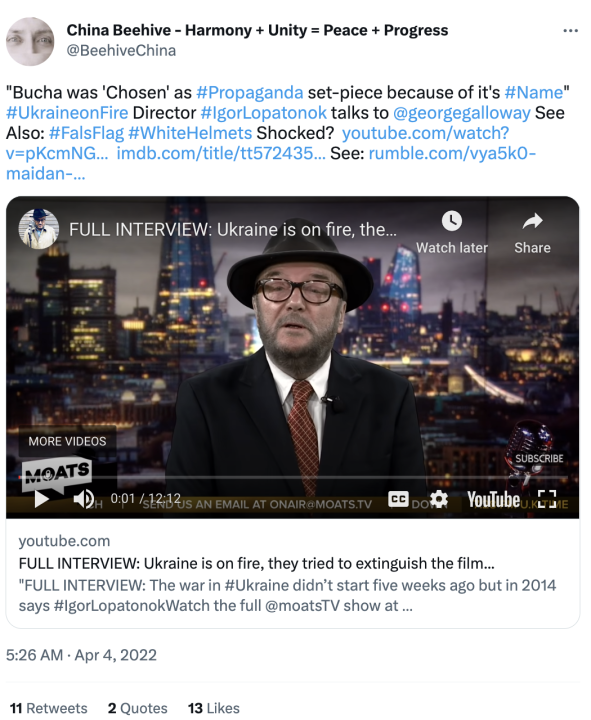
Pro-Russia influencers parrot Chinese narratives
Nearly all the pro-Russia influencers examined in this piece pioneered their tactics during the Syrian war. From claims of false flag attacks to demeaning rhetoric about the opponent, these propagandists honed their strategies in Syria and have now pivoted to supporting Russia in its war against Ukraine. This pro-authoritarian alliance is also sympathetic to China, spreading Beijing talking points and sharing positions that reflect the narratives published by Chinese state media and tabloids.
For example, pro-Russia and pro-Assad commentator Galloway has praised Beijing’s pandemic response, spoken against the United Kingdom offering visas to Hong Kong residents, and called Taiwan a “renegade breakaway province.” In addition, Galloway has hosted @CarlZha on his talk show.
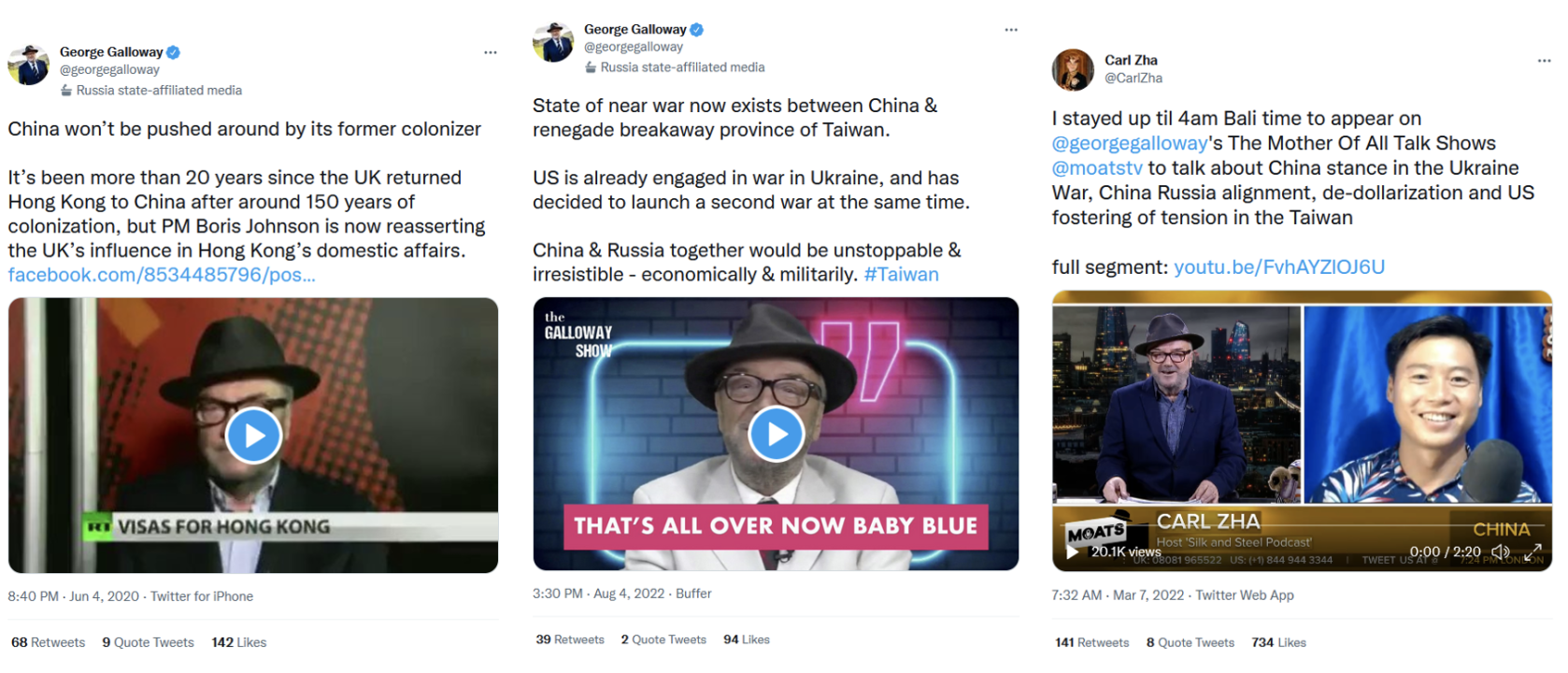
Another example is Max Blumenthal (384,100 followers), who founded the conspiratorial website The Grayzone. Blumenthal has spent years regurgitating pro-Assad narratives, with perhaps the most egregious example being the propagation of a claim that chemical weapons attacks against Syrian civilians were false flags.
In 2021, Blumenthal circulated a report criticizing human rights in America. The report was authored by the Chinese State Council and published during the height of China’s rally for Xinjiang cotton and boycott of Western companies. Blumenthal’s sharing of the report, and complimentary infographics from the Chinese state media outlet Global Times, was intended to distract his audience from Chinese human rights abuses.
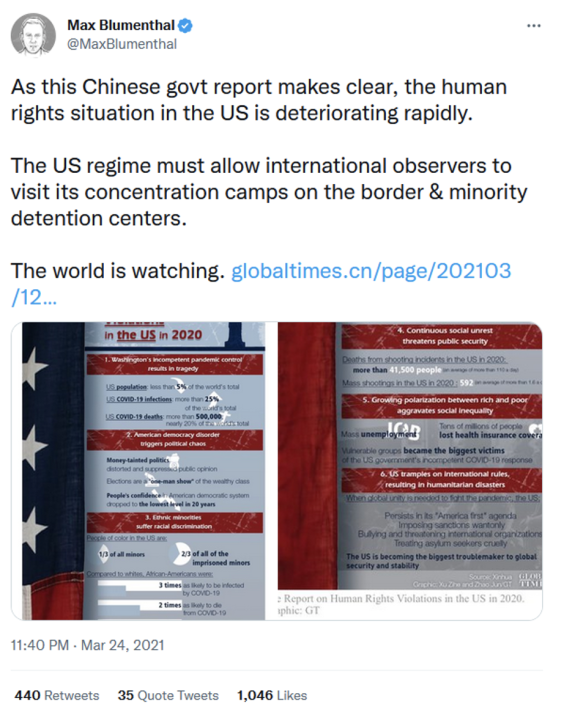
Blumenthal’s colleague at The Grayzone, Aaron Maté (297, 200 followers), also an Assad apologist, frequently spreads Russian narratives. Maté tweeted in support of China by suggesting the US had no evidence of an “Uyghur genocide.” He also criticized a visit to Xinjiang by Michelle Bachelet, head of the Office of the United Nations High Commissioner for Human Rights (OHCHR), because it “failed to find a genocide.” The OHCHR said the visit’s purpose “was not an investigation” on human rights. Nevertheless, a few months after the visit, OHCHR published a report that said China’s actions in Xinjiang “may constitute international crimes, in particular crimes against humanity.”
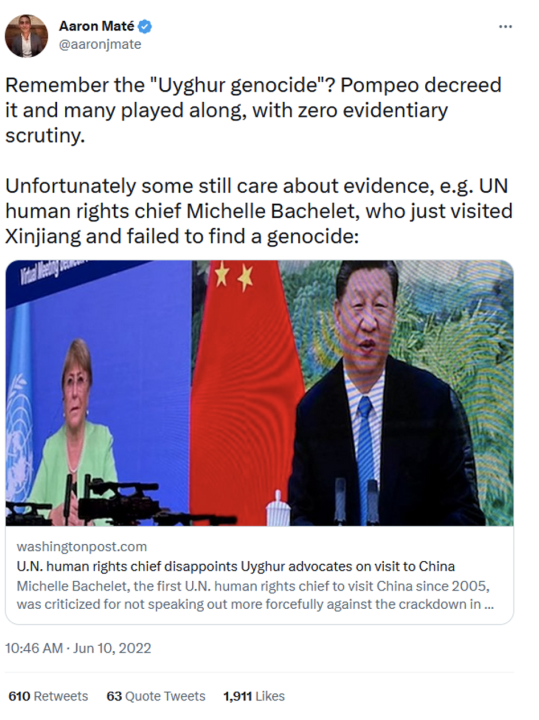
Another influencer who spreads pro-Russia and pro-Assad content is Rania Khalek (251,800 followers). On the first day of Russia’s invasion, she expressed sympathy for Russians because their standard of living would suffer due to US sanctions. Like other pro-Russia commentators, she amplified China’s narrative on Xinjiang with a link to Chinese state media during the peak of the “I support Xinjiang cotton” campaign.
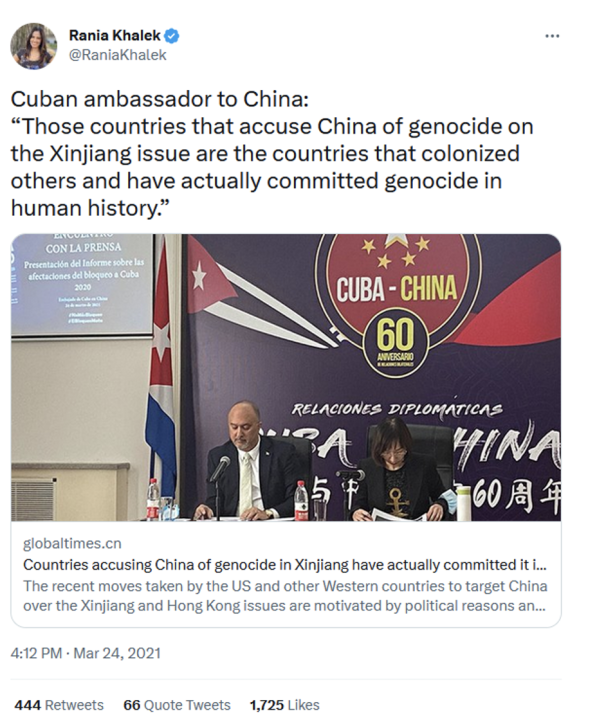
Further, influencer Caitlin Johnstone (218,900 followers), who also has a history of sharing pro-Russia content, blamed NATO and Ukraine for Russia’s invasion and promoted related conspiracies. She has also accused the West of “concern trolling” over China’s human rights abuses.
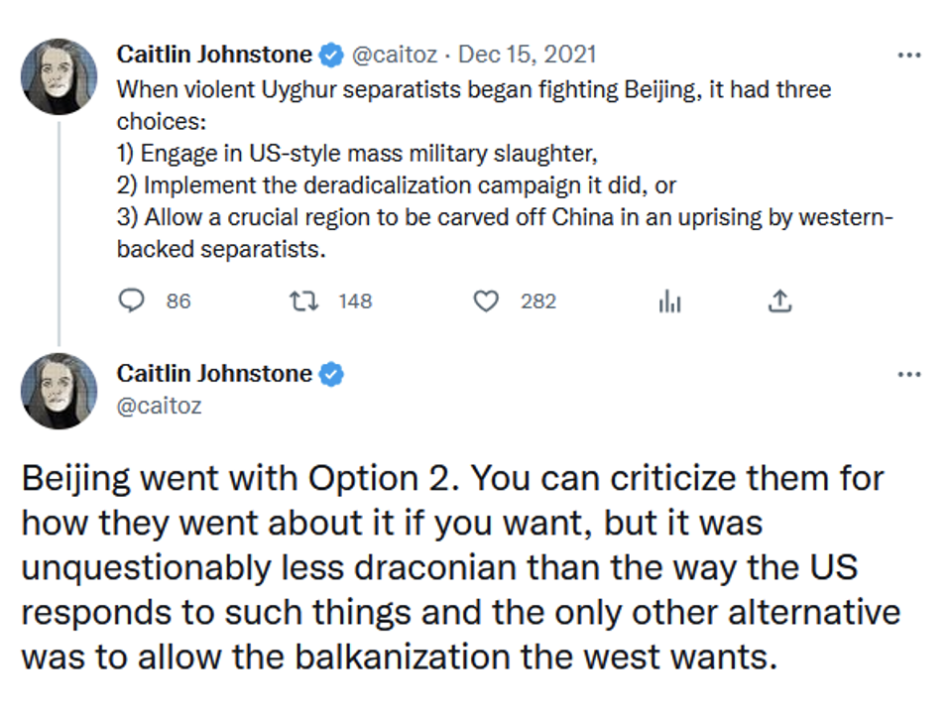
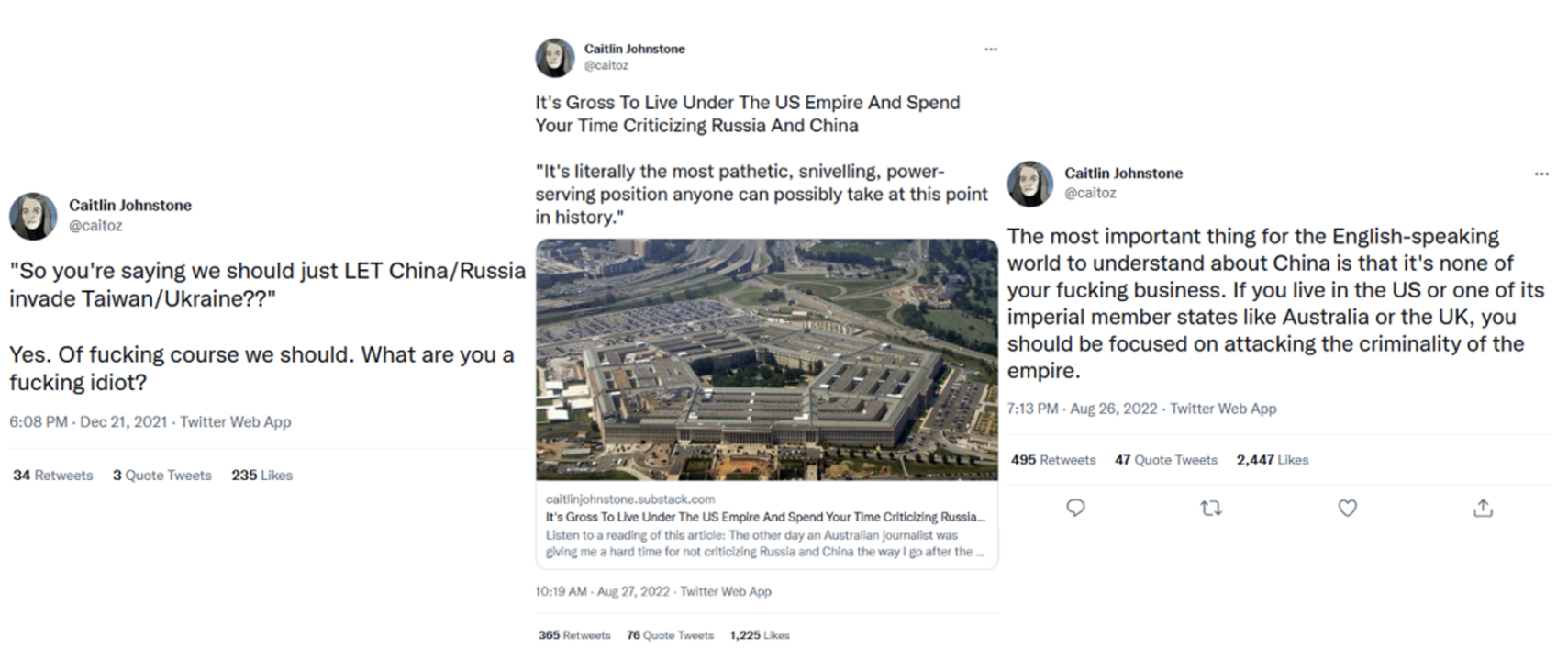
The cross-amplification of narratives between pro-China and pro-Russia accounts demonstrates the overlap in these two camps. There also appears to be a level of unification among accounts amplifying state media narratives when one of them is targeted. For example, when Twitter ascribed Galloway the “Russia state-affiliated media” label, @gmply555 came to his defense by mocking the action and calling the label the “official certification of the imperial army.”
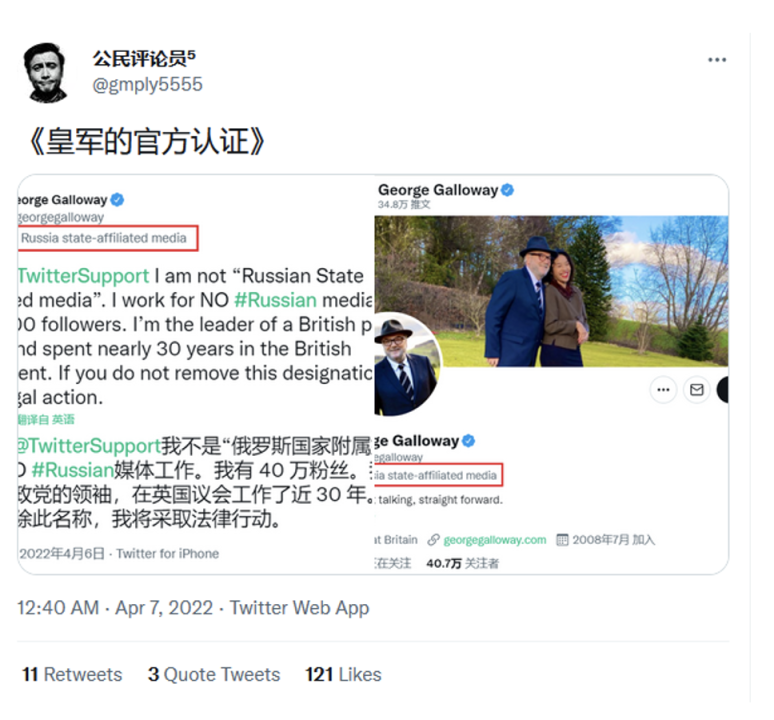
Suspicious activity
In addition, the authenticity of this community’s post engagement is questionable. For example, a TweetBeaver analysis of @gmply5555’s first twenty-five followers reveals many suspicious accounts with low follower/following ratios. Further, a query of Twitter users who shared a link to Barrett’s “Western Media Lies about China,” a bilingual YouTube video that attacks the BBC’s credibility, revealed several suspicious accounts. For example, some of the first accounts that shared a link to the video are old accounts that published only a few tweets before going inactive days after sharing Barrett’s video; these include @kenkang2313, @Km52028480, @lishizhao10160, @5efvKy6O7v2kGK4, @ZiShuo4, and @sunnysun2007.
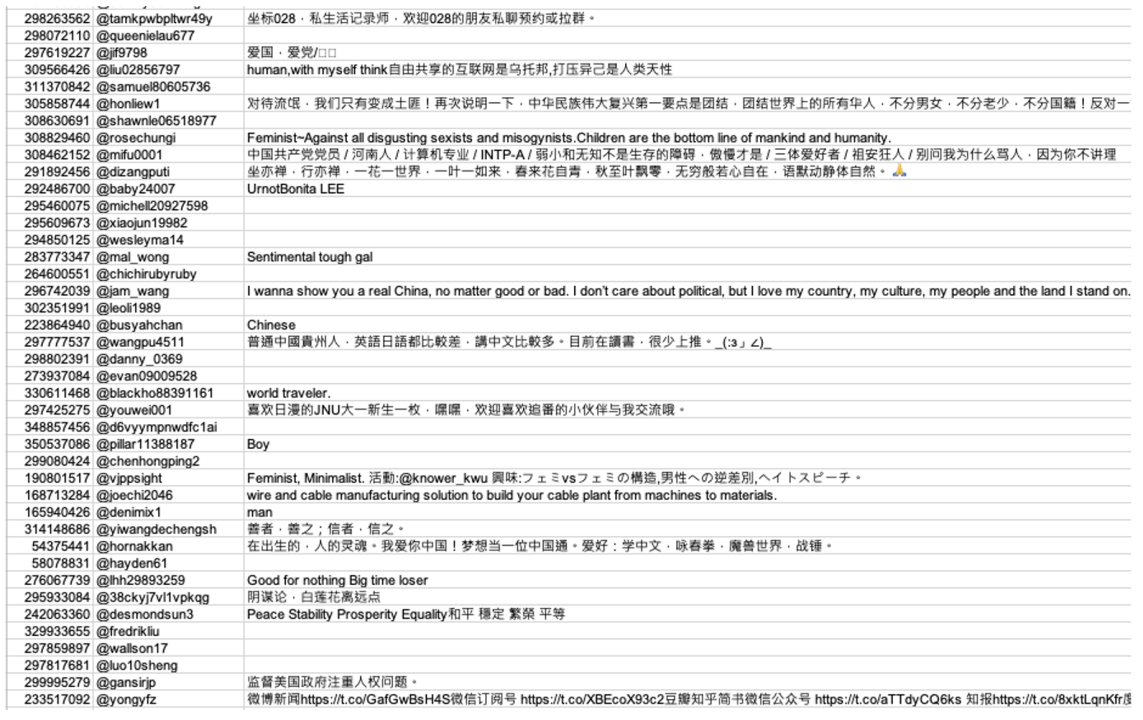
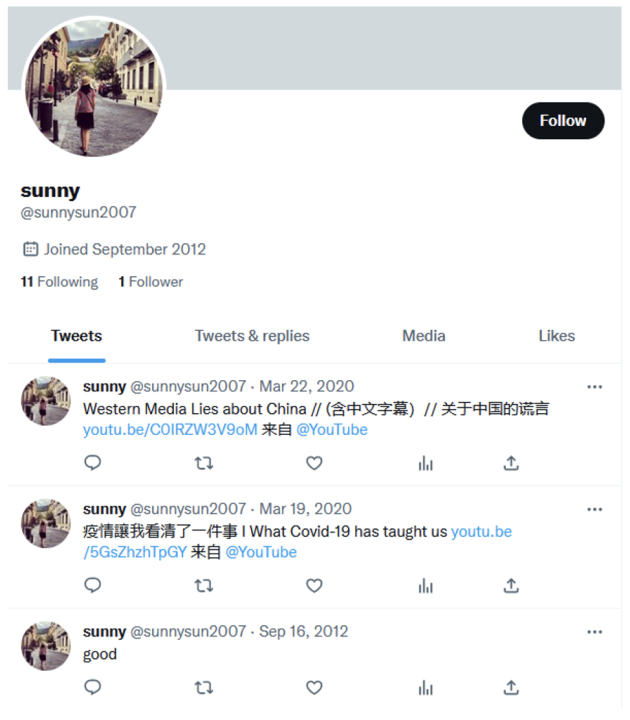
Anti-western ideology sustains and unites these pro-China and pro-Russia influencers. Using anti-imperialism as pretext, they denounce Western foreign policy, particularly that of the US and the UK. When negative news about Russia or China dominates the media cycle, they often steer conversations back toward the ills of the West. They maintain that Western governments have no right to criticize Russia and China due to their own imperial histories. However, anti-imperialism is only a rhetorical guise. These influencers tacitly aid Russia’s war efforts by amplifying disinformation from Russian state media. They justify China’s military aggression against Taiwan and deny human rights abuses against minorities like the Uyghurs. It appears that supporting Russian and Chinese oppression and expansionism does not constitute a double standard of their anti-imperialist stance. Absent a coherent or consistent anti-imperialist ideology, all that is left is anti-Western thought saturating this community.
Cite this case study:
Kenton Thibaut, “How pro-Russia and pro-China influencers cross-promote state narratives,” Digital Forensic Research Lab (DFRLab), March 27, 2023, https://dfrlab.org/2023/03/27/how-pro-russia-and-pro-china-influencers-cross-promote-state-narratives.

